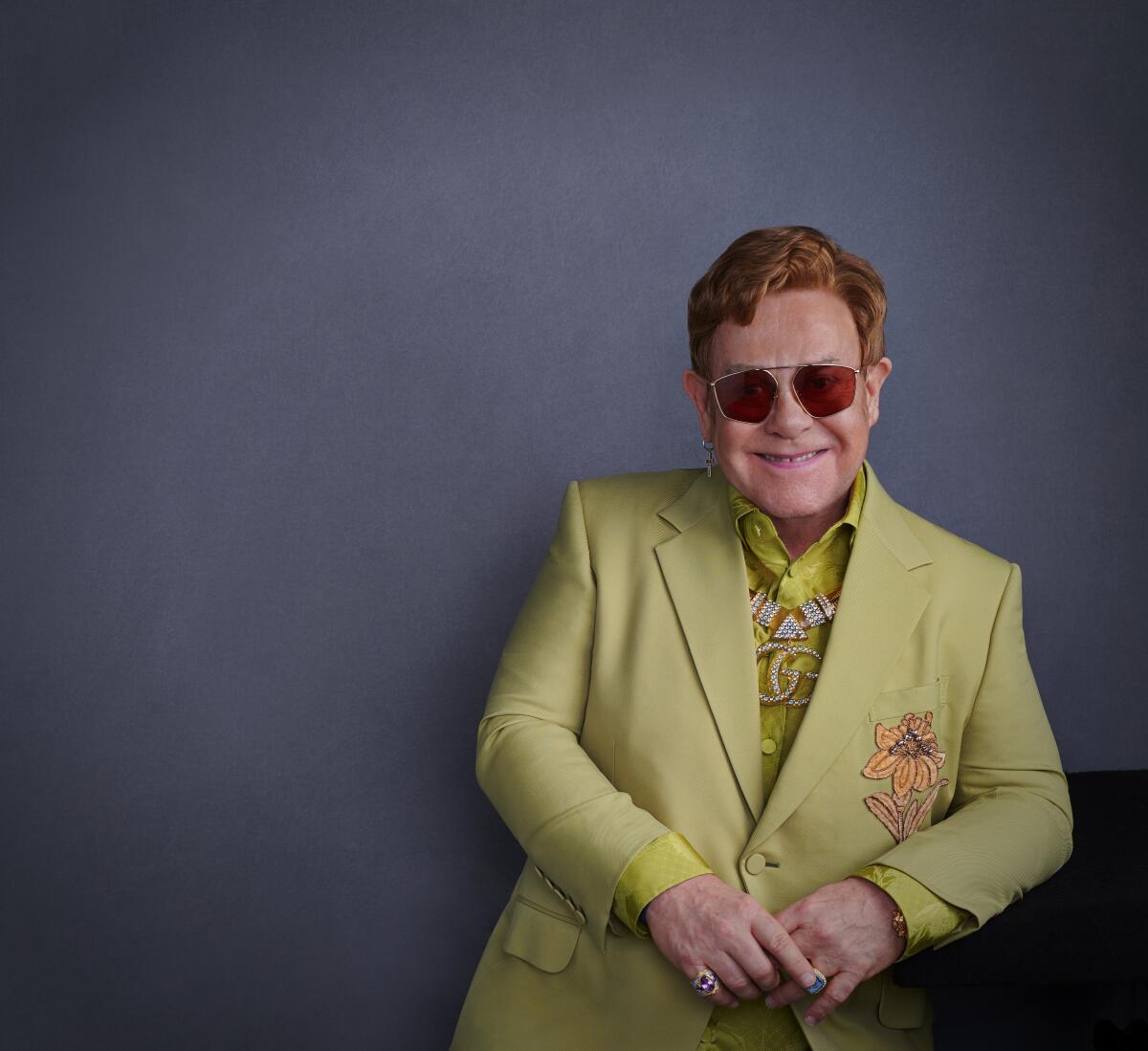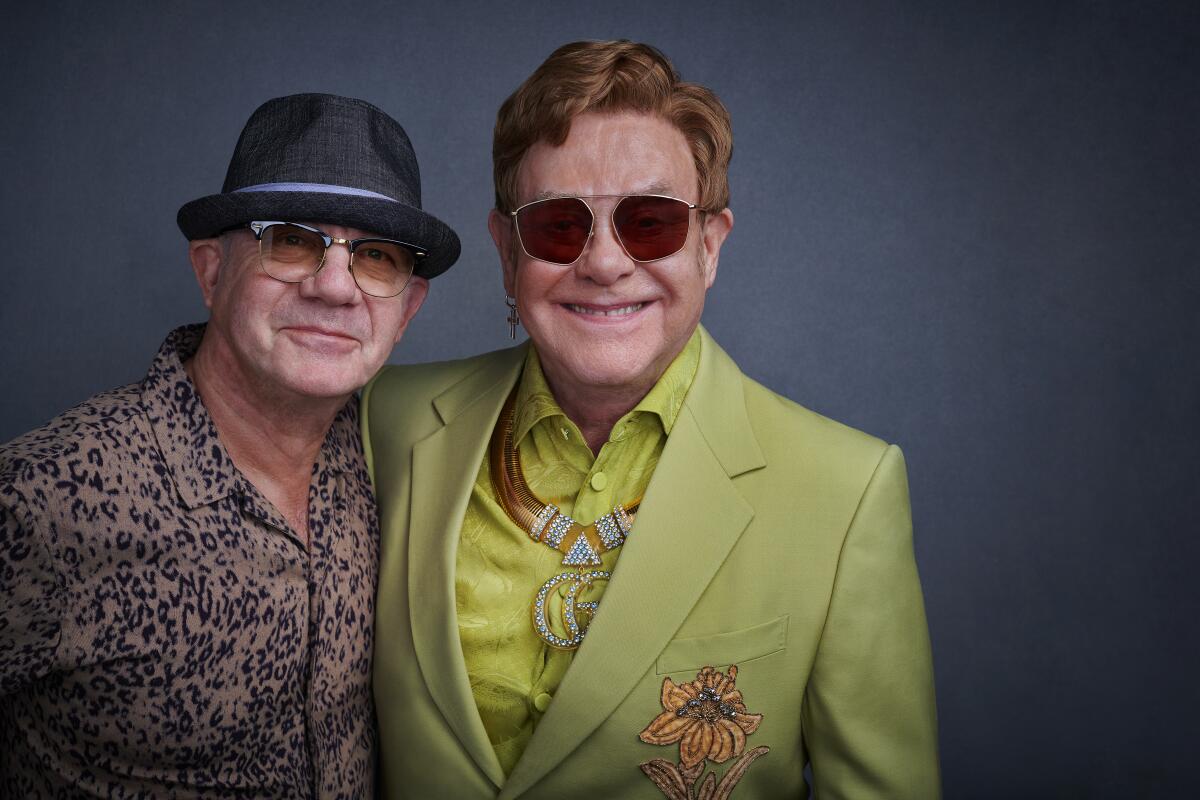Why Elton John had Cal Worthington and his dog Spot at his Dodger Stadium show

- Share via
To find Elton John and Bernie Taupin backstage at the Greek Theatre, you must wind through a narrow hallway populated by an army of production people and publicists, passing a series of small spaces, each now being used to fulfill some aspect of the evening’s agenda, which is to maximize Sir Elton’s time before he takes the stage to perform two songs with Taron Egerton, who plays the singer in the biopic “Rocketman.”
Finally, we reach the door to the green room and, after a knock or two, it is opened and there’s Elton John, wearing a Kelly green Gucci suit with matching Gucci shoes and an emerald necklace. (Yes, also Gucci.) Taupin, seated next to his songwriting partner of 50-plus years, is dressed more casually. But then, Louis XIV, if he was alive and in the room, would be, by comparison, dressed more casually. In person and at the age of 72, John remains electric music and solid walls of sound.
John immediately takes pains to explain that this is most definitely not the outfit he will be wearing onstage tonight.
“This is my ‘Coming to the Greek suit,’” John says. “I’m very fond of the Greek, so I wanted to wear something special for the occasion. I have another one for the stage,” pointing to a bold, geometric print jacket, Gucci by way of Mondrian, with silver, sequined lapel trim.
I’m carrying a copy of John’s memoir, “Me,” which had hit stores the day before the concert. I wanted John to perceive, if only subconsciously, that I had bought it, read it and come to the interview prepared. He noticed and offered to sign it. A woman, who had been identified to me earlier as his “chief of staff,” materialized instantly with a black Sharpie. I discovered later that she doesn’t actually go by that title, but I prefer to live in a world where Elton John employs a chief of staff to oversee his life, keep his brooches and sunglasses organized and make sure there’s always a Sharpie at the ready.
From devil horns and feathers to 250,000 Swarovski crystals on a baseball uniform, Julian Day delighted in designing costumes for “Rocketman.”
He certainly needs the support. John has performed 126 dates on his “Farewell Yellow Brick Road” tour that began in September 2018. There are 224 more concerts scheduled in the next 13 months. John has finished writing the music for a Broadway musical adaptation of “The Devil Wears Prada.” “Me” is lodged on the bestseller lists. “(I’m Gonna) Love Me Again,” from “Rocketman,” is a good bet for an original song Oscar nomination. John and Taupin are, at this very moment, writing songs for a new album.
Which is to say, the calendar is full. But here, backstage at the Greek, on a cool October night, a sliver of time has been arranged for John and Taupin to talk about how their “love story” plays out in “Rocketman.”
In the movie, there’s a party scene at Mama Cass’ legendary Laurel Canyon home just after your triumphant 1970 Troubadour concert. Bernie goes off with a woman and Elton, you’re left there alone, feeling betrayed by your mate. Is that how it happened?
Taupin: We didn’t go to Mama Cass’ house after the Troubadour. They had to condense that. But Elton did get bent out of shape because a group of us, the day after we arrived in Los Angeles, rented a car and went to Palm Springs. And you didn’t like the fact that we left you behind.
John: I didn’t know anybody. All my best mates, Bernie, [producer] Steve Brown, left me there. I wasn’t angry. I was panicking a bit. That’s all. I was in a brand-new country.
What did you do?
John: I can’t remember.
Taupin: I’ll tell you what he did. He built up a head of steam about it and let us know he wasn’t happy when we got back. Didn’t you throw [manager] Ray Williams ...
John: ... in the swimming pool? Yes. Yes I did.
First impressions of L.A. in the movie are confined to palm trees and Tower Records on Sunset. What would you add?
“L.A. to me was “The Beverly Hillbillies” and “77 Sunset Strip.” You fantasize about these things. You think you’re going to see the Four Tops walking down Sunset Boulevard.”
— Elton John
John: What the movie didn’t show is that when we arrived at LAX, the record company had hired an old, old London bus to take us to our hotel. I had been dreaming of American cars all my life — Cadillacs. It was like that scene in “Blazing Saddles.” “Oh, how ordinary.” We’ve come all this way and we’re being picked up by a London bus.
But we soon got over that because you’re looking out the window and it’s Los Angeles. L.A. to me was “The Beverly Hillbillies” and “77 Sunset Strip.” You fantasize about these things. You think you’re going to see the Four Tops walking down Sunset Boulevard or Joni Mitchell carrying a guitar. I didn’t care about that, really. I wanted to see “77 Sunset Strip!” [laughs]
Five years later, you were headlining Dodger Stadium, two days after swallowing a bunch of pills and diving into a swimming pool. Was that kind of resiliency typical of that period?
John: I’m built like an ox. Mentally, those nights at Dodger Stadium, I was getting away from what was going on in my real head. I was doing my job and enjoying it. In fact, it was probably a big relief.
Taupin: I was there both nights and it was extraordinary. Just two days after going to the hospital ... and here he was. It was the ultimate California dream, the Vesuvius of everything we’d come to do in California.
John: If you’re an artist and you have a special quality about you, you must always pull those things off. They don’t come around often, so don’t blow the chance. You use all your professional experience to help you.
I was excited. We had Cary Grant backstage — one of the greatest heroes of my life and such a wonderful person. And we had Cal Worthington ...
Why did you have Cal Worthington?
John: He was on the television all the time. I wanted Cal Worthington there. I requested Cal Worthington. He brought the lion, I think. “Go see Cal!” He was a legend to me.
Taupin: We came from England, where there were maybe three channels on TV. We came here and got pizza at midnight and you could watch TV. “Go see Cal! Go see Cal! Go see Cal!”
John: I was addicted to “The Price Is Right.” If you went on a quiz show in England, the prize was a pot of jam. Here you got cars! It was the American experience. And I wanted to acknowledge that Cal Worthington had given me ... not pleasure, particularly, but he was a character and he was part of our American experience in California.
So by the time I got onstage, the buildup had been so extraordinary that I had to live up to it. It was like singing at Diana’s funeral. I knew I had to do the best I can and just block out everything else. I wasn’t singing “Candle in the Wind” for me. It’s something I had to do and I had to do it well because there’s never going to be another chance to do something like this. I hope. I wanted to pay tribute to her.
Were you concerned about how the movie would portray your friendship?
Taupin: I was afraid it was going to be corny. It could have been a train wreck.
John: The bit when I’m going on at the Albert Hall and I say to him, “Nobody’s paying to see Reginald Dwight! They pay to see Elton John!” And I lose my temper and storm off. Then I walk back. “Sorry.” And he says, “Yeah. I know.” That’s how it was.

Taupin: It’s not contrived. We understood each other, wholly and completely. I think that emanates through the film.
John: The scene that reduced me to tears when I saw the movie at Cannes is when Bernie visits me at rehab. It just hit me that, yeah, if I hadn’t had him, my life would have been [expletive] horrible. We’ve both been through triumph and anguish and we’re closer now than ever. That kind of love is very hard to come by.
After this tour ends — it is ending, right? — Elton says he’s probably never going to perform most of these songs again. Are you OK with that, Bernie?
Taupin: We have a lot of songs. And we’re writing new ones now. I think it’s exciting.
John: I can’t wait to not play a lot of the songs I’ve played during my career, and I can’t wait to play the songs that I do love that I haven’t played and deserve to be heard. Like Bernie says, there’s so many of them. There must be 50 or 60 of them. There’s songs from “The Diving Board,” which is one of my favorite records, songs from “The Union.” I’d like to do “Come Down in Time” again. Anything from “Tumbleweed [Connection].”
People say, “They don’t write great songs anymore.” People don’t bother to listen. We’ve never stopped. Right now we have to play the hits, but I don’t want to do that anymore after it’s finished.
Is there any song you won’t be able to drop?
John: I don’t know if I’ll keep any of them! “Someone Saved My Life Tonight” is one of the greatest songs I’ve ever written. And I just had an epiphany through this tour with this song. But I don’t know. I can’t predict what I’ll do.
I told Bernie I wanted the new songs to sound as big as the Grand Canyon, as empty as the Grand Canyon and as cinematic as the Grand Canyon. That’s where I’m at. After this, I just want to go out and play the Grand Canyon.
More to Read
Only good movies
Get the Indie Focus newsletter, Mark Olsen's weekly guide to the world of cinema.
You may occasionally receive promotional content from the Los Angeles Times.











